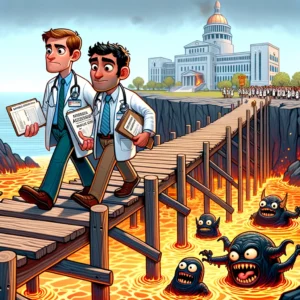
Of all the graduate and professional schools, medical school has the most onerous admissions process. Between MCATs, science prerequisites, personal statements, and secondaries, it can certainly feel overwhelming.
In the 15 years we’ve been helping applicants earn admission to their dream schools, we have become quite familiar with how difficult it can be to juggle all of the different pieces of written application materials. Crafting these components effectively requires a clear understanding of their distinct purposes and how they interrelate. This article will guide you through strategizing each part of the AMCAS application to present a compelling and cohesive narrative to admissions committees.
Planning Your Application
The best approach to tackling the AMCAS application is to begin with comprehensive planning. Start by reviewing the secondary essay prompts for all the schools you are applying to. While many of these prompts for the current application cycle may not yet be released, you can look at last year’s prompts, as they often remain largely unchanged. By gathering all the prompts, you can map out a plan to cover all your main points without redundancy.
The Personal Statement
The AMCAS personal statement serves two primary purposes: explaining the source of your interest in medicine and making the strongest case for your admission. Think of the personal statement as your opportunity to make a powerful impression on the committee in just 90 seconds. This requires focusing on depth, storytelling, and personal authenticity.
1. Depth and Storytelling: Your personal statement should delve deeply into your motivations for pursuing medicine. Use storytelling to illustrate your journey, highlighting pivotal moments that shaped your decision. Avoid generic statements; instead, provide specific examples that demonstrate your passion and commitment.
2. Personal Authenticity: Authenticity is crucial. Admissions committees want to see the real you, not an idealized version. Reflect on your unique experiences and perspectives, and convey them honestly. Authenticity resonates more than trying to fit a perceived mold of what a medical school applicant should be.
The Work & Activities Section
If the personal statement is about depth, the Work & Activities section is about breadth. This section allows you to demonstrate that you are a well-rounded candidate by showcasing a range of experiences. The main categories to cover are academic readiness, scientific bona fides, service, leadership, and character.
1. Verbs and Actions: Focus on what you did in each activity. Use strong, action-oriented verbs to describe your roles and contributions. This not only highlights your accomplishments but also demonstrates growth, initiative, and leadership.
2. “Most Significant” Entries: In the Work & Activities section, you have the opportunity to designate three experiences as “most significant.” Use these longer entries to provide depth to your application, complementing the breadth demonstrated in the other entries. If your personal statement focuses heavily on one or two areas, use these significant entries to balance your application by highlighting other aspects.
3. Avoid Redundancy: While it is fine to reference an experience mentioned in your personal statement, avoid repeating the same information. Instead, provide additional insights or details that were not covered in the personal statement.
The Secondary Essays
Secondary essays are school-specific and allow you to demonstrate why you are a good fit for each particular institution. These essays should be tailored carefully to address each prompt and align with the values and mission of the school.
1. School-Specific Fit: Research each school’s mission, values, and programs to understand what they are looking for in applicants. Use this information to craft essays that not only respond to the prompts but also highlight how your experiences and goals align with the school’s ethos.
2. Repurposing Text: While it is efficient to repurpose sections of text for multiple secondaries, do so with caution. Ensure that each essay remains responsive to the specific prompt and tailored to the school’s unique characteristics.
Integrating Key Concepts
As you compile these components, it is essential to integrate key concepts that medical schools value: leadership, service, advocacy, outreach, cultural competency, and diversity. Find ways to infuse your experiences with these themes, demonstrating your commitment through actions you have taken.
1. Leadership: Highlight instances where you have taken initiative, led teams, or influenced positive changes. This can be in academic, professional, or community settings.
2. Service: Showcase your dedication to serving others, whether through volunteer work, community service, or patient care experiences. Emphasize the impact you have made and the lessons you have learned.
3. Advocacy and Outreach: Demonstrate your involvement in advocacy or outreach efforts, especially those aimed at addressing healthcare disparities or improving community health. This shows your commitment to making a broader impact in medicine.
4. Cultural Competency and Diversity: Reflect on experiences that have enhanced your cultural competency and ability to work with diverse populations. Medical schools seek applicants who can navigate and contribute to diverse environments effectively.
Final Thoughts
Strategizing your AMCAS personal statement, Work & Activities, and secondary essays involves a careful balance of depth and breadth, authenticity, and strategic alignment with each school’s values. By planning ahead, focusing on what each section is supposed to accomplish, and integrating key concepts valued by medical schools, you can present a compelling and cohesive narrative that maximizes your chances of admission.
Remember, the goal is to provide a comprehensive picture of who you are as an applicant, highlighting both your qualifications and your personal journey toward a career in medicine. With thoughtful planning and execution, you can create an application that stands out and resonates with admissions committees.
For more help with your personal statement, check us out at Gurufi.com. Our personal statement editors and consultants have decades of experience helping clients get into top medical schools. Our specialty is helping you craft compelling personal statements that move the needle in your admissions process! For questions, shoot us an email at service@gurufi.com. Check us out on Facebook, Twitter, and LinkedIn.




